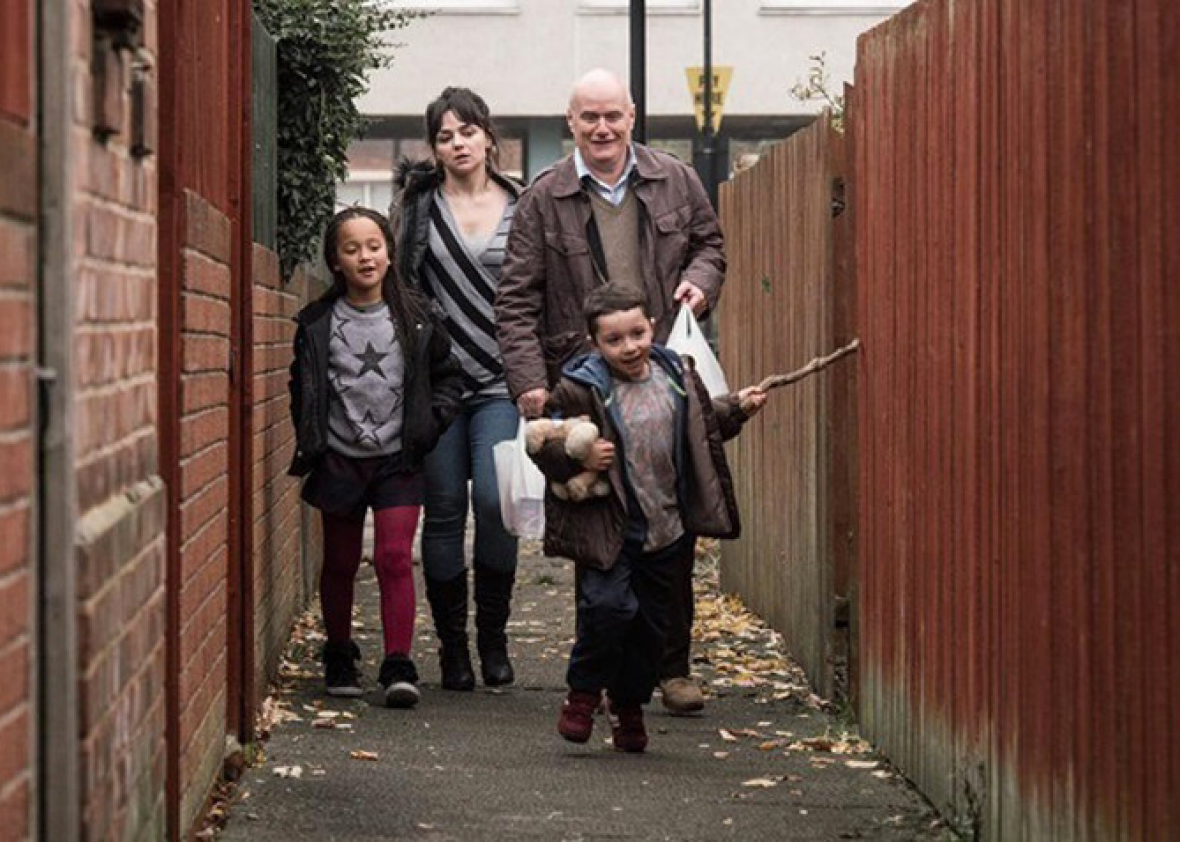Everyone knows a Daniel Blake. He’s a bloke who follows the rules, but who won’t comply with directions that make no sense. A man who’ll help his friends and neighbors whenever he can but knows when he’s being taken for a fool. A guy whose patience is finite. As Ken Loach’s Cannes Palme d’Or–winning I, Daniel Blake reminds us, institutions like Britain’s welfare system—constructed around the assumption that claimants don’t deserve the benefits they apply for—are especially hard on people like this. When the system is rigged, trying to do the right thing wears a man down.
Comedian Dave Johns is great as Blake, whose deep reserves of good humor are rapidly being exhausted. He’s a 59-year-old widower and carpenter just recovering from a heart attack, and in the movie’s opening seconds, we already sense that he’s shagged. Summoned to a hearing to assess the state of his health—and thus his eligibility to keep receiving disability benefits—he refuses to follow the farcical script. Since his cardiology specialists, who’ve actually examined him, say he’s too sick to return to work, Dan assumes the “health care professional” conducting the verbal assessment will reach the same conclusion. But the questionnaire she insists on leading him through, irrelevant question by irrelevant question, decides otherwise. And thus begins his hellish journey through a bureaucracy that seems messed up by design.
Dan is self-sufficient by nature. He spends his days and nights alone at home, carving wooden figures and listening to the radio. When he learns that his benefits have been cut off, he seeks help the only way he knows how: by reaching out to other human beings. But that’s not how the system is designed to function. He runs up a huge phone bill waiting on hold for a so-called help line, only to learn that he can’t appeal until “the decision-maker” confirms the results of that pointless questionnaire. Never mind that this anonymous bureaucrat will be working from the exact same answers that have already sealed his fate.
Dan heads to the Jobcentre Plus, the government’s assistance clearinghouse—a place that’s supposed to assist people in need, but where instead the staff act as if its purpose is to humiliate the unemployed. When a sympathetic worker goes off script and offers concrete assistance to Dan, she’s given a dressing-down by her supervisor; the office can’t afford to set such a dangerous precedent. With his disability benefits cut off, he’s forced to apply for unemployment—a process mined with booby traps at every turn. The system is “digital by default,” a massive challenge for a man who’s never been near a computer in his life. And never mind that his doctors say he’s too sick to work; he’s still forced to spend his days chasing nonexistent jobs he couldn’t take even if they were offered.
During a frustrating visit to the Jobcentre, Dan intervenes when he sees a young mother being given the same heartless treatment he’s all too familiar with. Katie and her two kids, he learns, are recent arrivals from London. After two years in a homeless hostel, the authorities have rehoused them in Dan’s home city of Newcastle, 275 miles away but on a different planet, culturally speaking, from the capital. “Sanctioned” by the Jobcentre for arriving late for an appointment—they don’t care that she hasn’t yet figured out the bus system—she lacks the money to meet her family’s most basic needs. Hayley Squires, who plays Katie, is utterly convincing as a woman who is desperate to protect her kids from repeating the mistakes she’s made.
Loach is an old leftie who has spent his long career making agitprop movies, starting 50 years ago with Cathy Come Home, a television play that brought the problems of homelessness into British living rooms. Since then he’s tackled illegal abortion, the death penalty, the Spanish Civil War, the troubles in Northern Ireland, the Irish rebellion, Nicaragua’s Sandinista revolution, and offered several takes on the age-old story of the bosses exploiting the workers. It shouldn’t be surprising that a man whose films extol the benefits of union organizing should make heroes of those individuals who help their fellow citizens. In I, Daniel Blake, the men and women who organize neighborhood food banks, do chores for a sick friend, or show a clueless old guy how to use a computer mouse are rare points of light in a world that’s been made darker by the loss of labor-union solidarity.
The Newcastle residents’ Geordie accents, especially those of the nonprofessional actors in the cast, might leave some U.S. viewers longing for subtitles, and the confusion of benefits programs will have them wondering how, exactly, the British welfare system is supposed to work. It’s enough to say that the situation presented in the film is depressingly accurate. This fall, the government announced that it will finally relax the requirement that people with severe conditions must keep repeating the Work Capability Assessment—the test that begins the film—in part because it is thought to have led to a number of suicides (a research finding the Department of Work and Pensions disputes) and partly, perhaps, because of the “I, Daniel Blake effect.”
If Daniel Blake had an American cousin, he’d be even worse off, of course, since Britain’s National Health Service at least takes care of English Dan’s medical needs. That makes the movie even more powerful and necessary over here. In a country where the system promises so much less, a man’s dignity is even more precious.
Read more of Slate’s coverage of the Oscar race.
